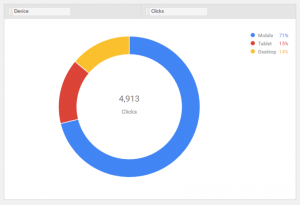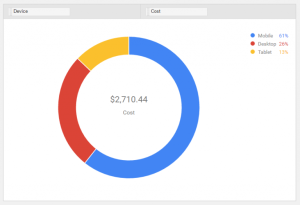It’s 2022, get with the program. With the huge spike in internet purchases, never before seen, it’s critical to your success that your website is now mobile optimized. This article was updated on February 24th, 2022. Originally authored in 2018.
This is a question I don’t get enough, “why mobile matters.”
Frequently, I’ll come across small businesses that have no mobile presence, or worse, a terrible mobile presence. Mobile matters, more than 80% of all clicks generated for dorsay clients this month have been mobile or tablet. That’s 80% of clicks from mobile devices, that’s huge.
What is a mobile device?
Let’s talk briefly about what constitutes a mobile device. Any smartphone, or tablet with a full browser and capabilities of reading HTML, jQuery, AJAX, and other languages that make a website have motion or display anything. So, this means any iPhone, Android, or Windows phone is capable of seeing a website on a mobile device. Secondly, nearly all people with a smartphone use it to find stores, food, browse for services, etc.

What is mobile optimization?
Mobile optimization is making sure your website is compatible with a mobile browser. This means that the text is large enough to read, and the buttons large enough to push. In addition, ensuring that everything displays within the viewport and it renders the data fast. Yes, speed is important. Furthermore, speed is a huge factor, all the search engines want your website to have a small load and render quickly. It’s important because of the number of website results that are rendered thru searches. For mobile phones, a large page load means and increased use of people’s data. So having a website not optimized for mobile is a disservice to your customers.
Misconceptions about apps
Having a mobile-optimized website does not mean you have to spend an extravagant amount of money on an app. The difference between an app and a mobile website is that apps are installed on your device for a specific activity. A mobile-optimized website is a version of your website that simply shows up properly on a mobile device.

Some data about mobile usage
We’ve generated over 40,000 clicks for my customers last quarter, and 74.4% of those clicks were generated from a mobile device with a full browser. As of 2018, a study conducted by Pew Research indicated that 64% of American’s have a smartphone. 19% of those rely almost completely on their mobile devices to access online services. Those are the simple numbers, and they speak for themselves. I heavily dislike using statistics and studies to prove a point, but my data generated from customers’ Google AdWords accounts speak for themselves. In addition, in some trend analysis I’ve completed, I’ve found that regularly, mobile devices cost less in the PPC world than desktops.
Why mobile matters
The short and narrow of it, you need to have your website optimized for mobile. It reduces data usage for customers, makes for better search results, and enhances the user experience. Most importantly, the fact that more than 80% of all of the clicks we’ve generated this year are from mobile devices. If your website is not mobile optimized, it’s not doing anything for you, except hurting you, that’s why mobile matters.





